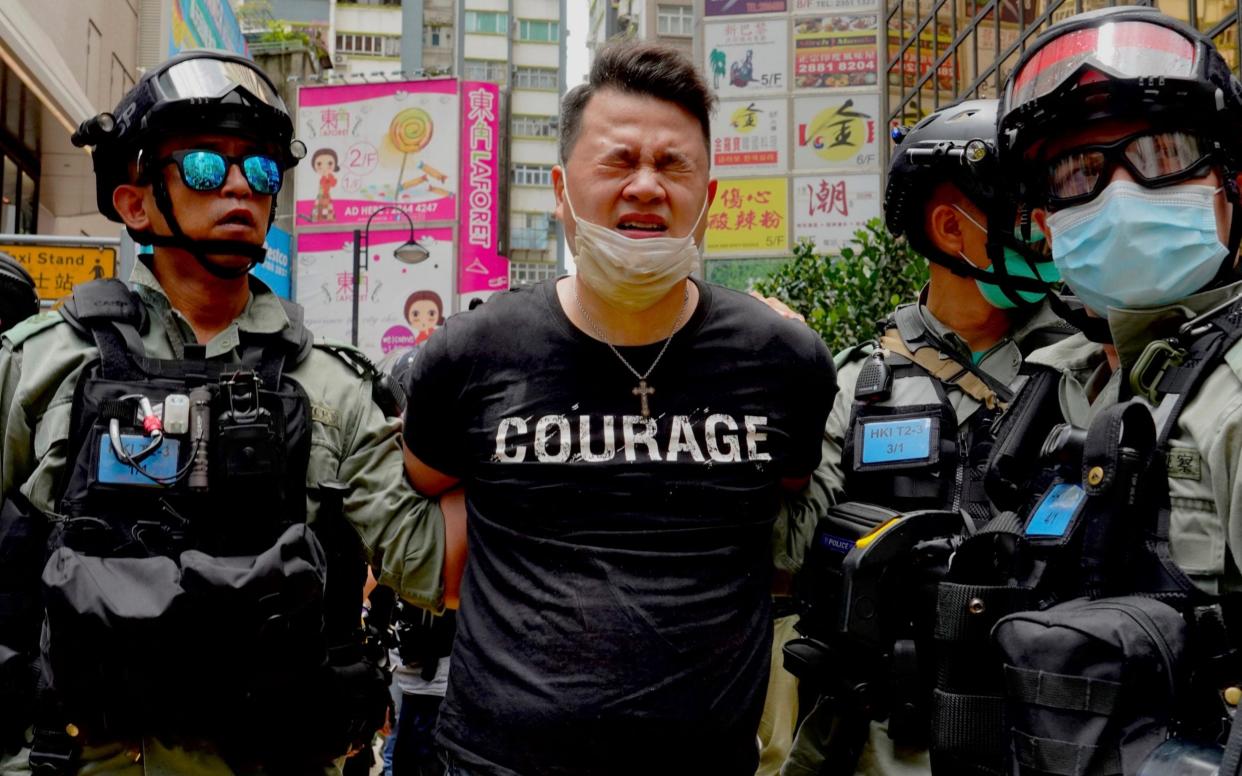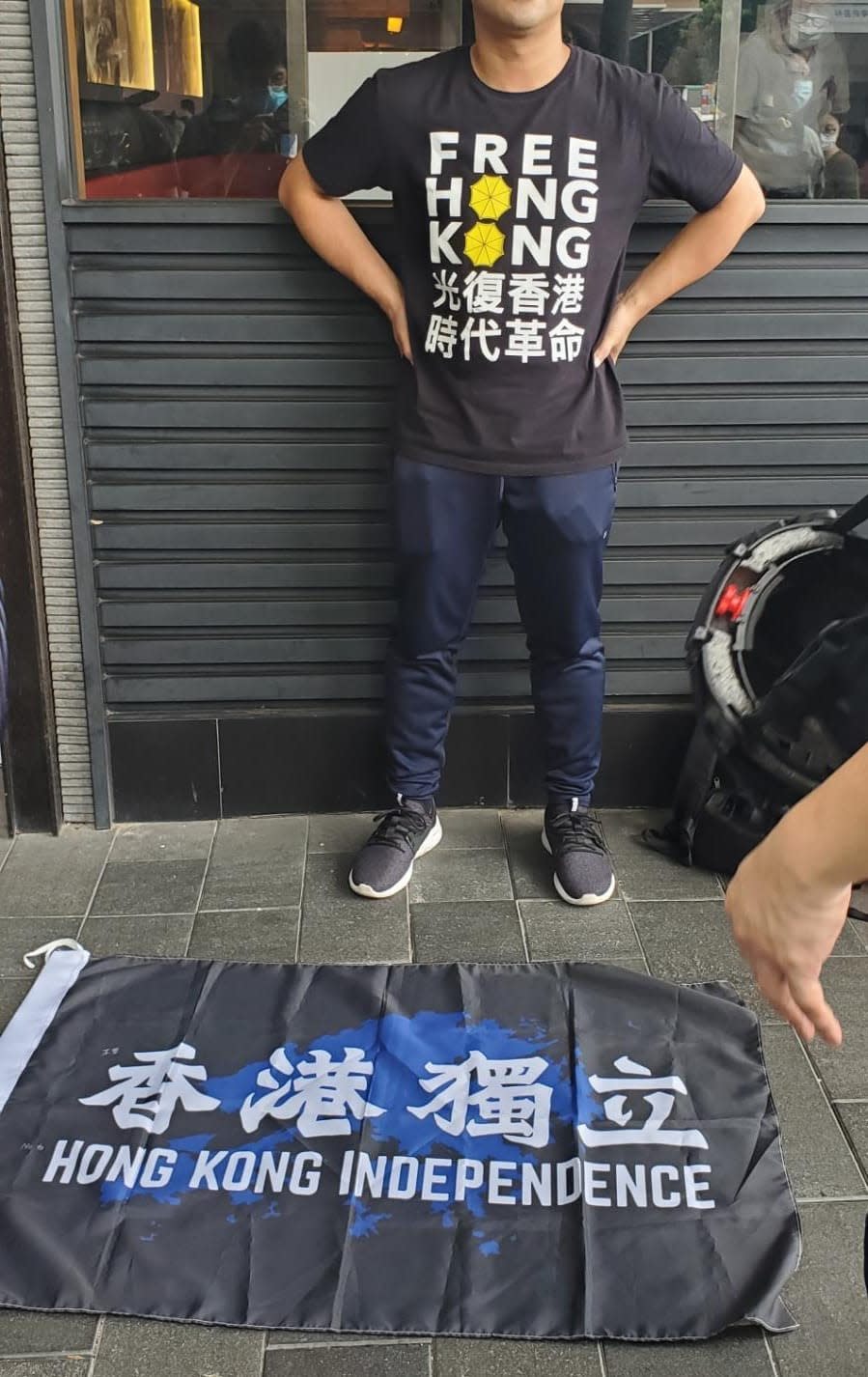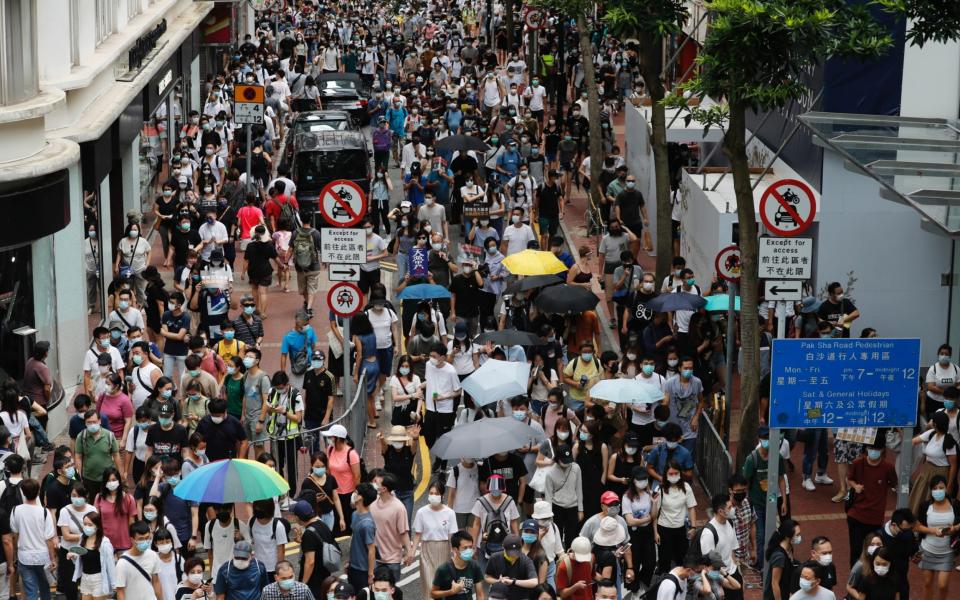'Resist until the end!' Crowds spill into streets of Hong Kong facing water cannon and arrest to protest new security law

They had been warned that merely chanting a slogan could risk prosecution under Hong Kong’s brutal new security law.
But still the protesters came, first in their hundreds, then in thousands. “One Hong Kong, One Nation!” they shouted in unison outside the high end malls of the city’s Causeway Bay, waving now-outlawed Hong Kong independence flags.
As riot police gathered, they raised their hands with their palms held high – a common symbol of year long pro-democracy protests that Beijing now intends to crush.
One group tore down a banner announcing the new law and stomped it into the ground. Police officers in riot gear and armed with rubber bullets were stationed on the corners of the city’s major streets, with instructions to immediately disperse any demonstrators, who had been forbidden from attending the usual pro-democracy march on the anniversary of the city's handover from Britain to China.
The force moved swiftly to break-up gatherings, targeting protesters and journalists with a water cannon firing bursts of liquid laced with a stinging pepper solution.
Shortly before 2pm, a man wearing a “Free Hong Kong” shirt became the first person to be arrested under the sweeping law enacted late on Tuesday.

A search had also yielded an independence flag, the police said in a statement, confirming that certain political views and symbols had become illegal overnight.
By early evening, eight more people had been arrested on suspicion of breaking the new law, which threatens life sentences for a range of ill-defined crimes including terrorism, subversion, secession and collusion with foreign forces.
Three of the detained were women who had been caught with leaflets showing independence messages.
“Anyone who organises, plans, commits or participants in committing secession or undermining national unification shall be guilty of an offence,” clarified the Hong Kong Police.
As the unrest escalated, protesters built barricades out of poles and traffic cones and dug up paving stones to block traffic on major roads.
A total of 370 protesters were arrested, while the police said seven officers were injured, including one who was stabbed and three injured after being hit by a man on a motorbike.
Early on Wednesday, Zhang Xiaoming, executive deputy director of the Hong Kong and Macao Affairs Office of the State Council, China’s top executive body, said suspects arrested under the law would be tried in the mainland.
The threat of being extradited and disappeared into China’s opaque justice system is chilling to Hong Kong’s protesters, but many remained undeterred, and vowed to carry on their fight for basic freedoms.
“I guess at this point, when Hong Kong people are crushed by hopelessness and helplessness, coming out to the streets is the simplest thing to do to stand and walk by each other in support, keeping our stance against oppressive rulers and their minions,” said Ms Tsang, 23, a protesting law student.
“I feel it even more prominently that we need to show the world how we feel on this symbolic day, that we shouldn’t stay at home out of fear,” she said.

Beijing’s swift and secretive enactment of the law, which critics say heralds a new authoritarian era for the Chinese-ruled city, came into force on the 23rd anniversary of Britain’s handover of Hong Kong to China in 1997.
Mr Zhang described it as a “birthday gift,” while Carrie Lam, the city’s chief executive, defended it as ”constitutional, lawful, sensible and reasonable“.
The law allows Beijing to establish a new security office in Hong Kong, with its own law enforcement personnel, and to take over prosecution in “very serious” cases.
“The new law might be fairly described as an ideological and legal takeover. Whilst professing to respect the human rights and civil liberties preserved in the [Hong Kong] Basic Law, the sweeping and ill-defined provisions install a new legal landscape and a political and judicial structure loyal to Beijing,” said Schona Jolly QC, Chair of the Bar Human Rights Committee of England & Wales.
The British government reiterated its strong objections to the law on Wednesday, with Boris Johnson, the prime minister, calling “the enactment and imposition of this national security law constitute a clear and serious breach” of the handover agreement that guaranteed the city’s way of life until 2047.
The UK has now pledged to move forward with a promise to open the path to citizenship for up to three million Hong Kong residents eligible for a British National Overseas (BNO) passport.
British concerns have been echoed around the globe, with the European Union, Australia, Japan, Taiwan and the US among allies who have condemned Beijing’s move.
Back on the streets of Hong Kong, protesters admitted they were considering leaving their homeland in the wake of the new law.
Eric, a 30-year-old designer, said: “I still need to come out today and do as much as possible. I feel we are truly ruled by China now. I have prepared to leave Hong Kong but I still want to stay here.
"Here is where I have family and friends, and I still don’t have the courage to leave.”

